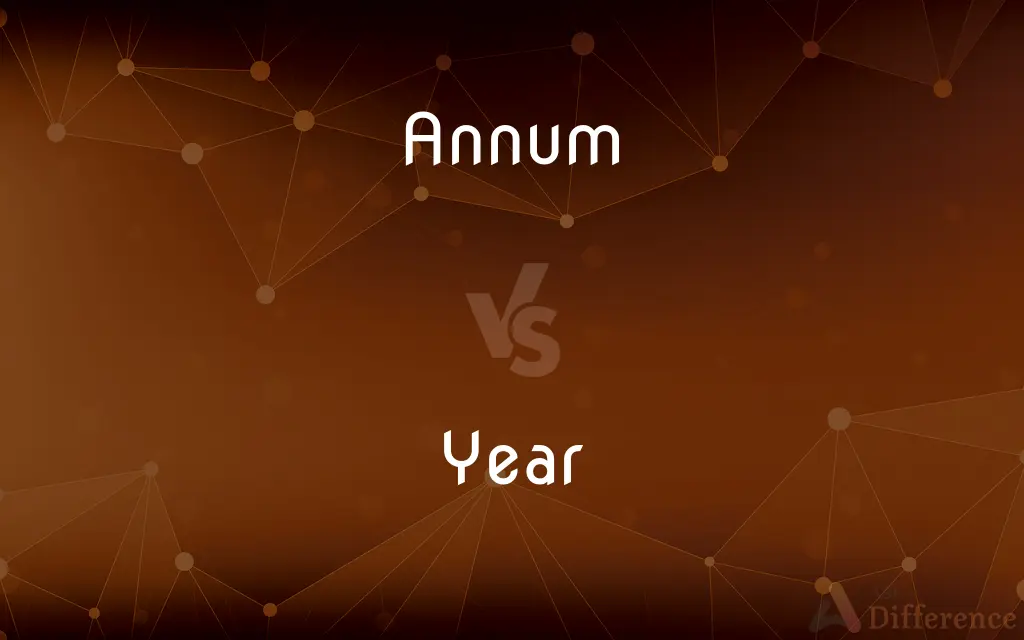Annum vs. Year — What's the Difference?
By Tayyaba Rehman & Maham Liaqat — Updated on April 21, 2024
Annum, a formal term primarily used in legal and scientific contexts, refers to a period of one year; year, a common word, denotes any period of 365 or 366 days.

Difference Between Annum and Year
Table of Contents
ADVERTISEMENT
Key Differences
Annum is often used in formal, legal, or financial documents to specify a period of one year, emphasizing precision and formality. Whereas, year is a more general term used in everyday language and can refer to any period of twelve months or the time it takes Earth to orbit the Sun.
In terms of frequency, annum is less commonly used in daily conversation and is typically reserved for specific contexts like annual reports or contracts. On the other hand, year is universally used across various contexts, from casual discussions about age to scientific studies about planetary movements.
The term annum is derived from the Latin word for "year," giving it a sense of classical education and formality. In contrast, year originates from the Old English word "gear," which is deeply rooted in everyday language and history.
When considering usage in calculations or specifications, annum is often associated with exact periods in calculations of interest, depreciation, or employment contracts. Whereas year can be more flexible, referring to fiscal years, calendar years, or academic years depending on the context.
Documentation that requires precision, such as legal texts or policy documents, typically uses annum to avoid ambiguity. Year, however, is more likely to appear in general communications, personal planning, and informal texts.
ADVERTISEMENT
Comparison Chart
Usage Context
Formal, legal, scientific
General, everyday contexts
Frequency
Less common, specific contexts
Highly common, universal usage
Etymology
Latin "annus" meaning "year"
Old English "gear" meaning "year"
Associated Concepts
Precision in documents
Flexibility in various contexts
Example Usage
"Salary of $50,000 per annum"
"I haven't seen you in a year!"
Compare with Definitions
Annum
Found in business contracts and agreements.
The lease agreement extends for $10,000 per annum.
Year
Refers to an annual cycle in many systems.
The fiscal year ends in December.
Annum
A period of one calendar year, used especially in financial and legal contexts.
The interest is calculated per annum.
Year
A period of 365 days or 366 in a leap year, common in all contexts.
I visit my hometown every year.
Annum
Used in formal or technical descriptions of time periods.
Payments are due annually, at $1,000 per annum.
Year
Used to denote age or experience.
My son is five years old.
Annum
Denotes yearly occurrences or measurements.
The report is published biannually, twice per annum.
Year
Measures the duration of events.
The project lasted two years.
Annum
Often seen in academic or scientific discussions.
The study examines climate variations per annum.
Year
Commonly used to describe periodic phenomena.
Yearly festivals bring joy to the community.
Annum
Synonym of year, particularly
Year
A year is the orbital period of a planetary body, for example, the Earth, moving in its orbit around the Sun. Due to the Earth's axial tilt, the course of a year sees the passing of the seasons, marked by change in weather, the hours of daylight, and, consequently, vegetation and soil fertility.
Annum
(uncommon) A one-year period, particularly (finance) a fiscal year or (sciences) a Julian year of exactly 365.25 days.
Year
The time taken by the earth to make one revolution around the sun.
Annum
A "year" determined by the revolution of an extraterrestrial planet.
Year
The period of 365 days (or 366 days in leap years) starting from the first of January, used for reckoning time in ordinary circumstances.
Annum
(Latin) year;
Per annum
Year
One's age or time of life
She had a composure well beyond her years
Year
A very long time; ages
It's going to take years to put that right
Year
A set of students grouped together as being of roughly similar ages, mostly entering a school or college in the same academic year
Most of the girls in my year were leaving at the end of the term
Year
In the Gregorian calendar, a period beginning on January 1 and ending on December 31, consisting of 365 or 366 days in 12 months. Also called calendar year.
Year
A period of 365 or 366 days used as the basis for another calendar such as the Julian calendar.
Year
A period of 12 or 13 lunar months in a lunisolar calendar such as the Jewish calendar.
Year
A period of 12 lunar months in a lunar calendar such as the Islamic calendar.
Year
A sidereal year.
Year
A solar year.
Year
A period of about a year
We were married a year ago.
Year
A period equal to the calendar year but beginning on a different date
A tax-reckoning year.
A farming year.
Year
An annually recurring period devoted to a special activity
The academic year.
Year
Years Age, especially old age
I'm feeling my years.
Year
Years An indefinitely long period of time
It's been years since we saw her.
Year
A solar year, the time it takes the Earth to complete one revolution of the Sun (between 365.24 and 365.26 days depending on the point of reference).
We moved to this town a year ago;
I quit smoking exactly one year ago
Year
(by extension) The time it takes for any astronomical object (such as a planet, dwarf planet, small Solar System body, or comet) in direct orbit around a star (such as the Sun) to make one revolution around the star.
Mars goes around the sun once in a Martian year, or 1.88 Earth years.
Year
A period between set dates that mark a year, from January 1 to December 31 by the Gregorian calendar, from Tishiri 1 to Elul 29 by the Jewish calendar, and from Muharram 1 to Dhu al-Hijjah 29 or 30 by the Islamic calendar.
A normal year has 365 full days, but there are 366 days in a leap year.
I was born in the year 1950.
This Chinese year is the year of the Ox.
Year
A scheduled part of a calendar year spent in a specific activity.
During this school year I have to get up at 6:30 to catch the bus.
Year
(sciences) A Julian year, exactly 365.25 days, represented by "a".
Year
A level or grade in school or college.
Every second-year student must select an area of specialization.
The exams in year 12 at high school are the most difficult.
Year
The proportion of a creature's lifespan equivalent to one year of an average human lifespan (see also dog year).
Geneticists have created baker's yeast that can live to 800 in yeast years.
Year
The time in which any planet completes a revolution about the sun; as, the year of Jupiter or of Saturn.
Year
Age, or old age; as, a man in years.
Year
A period of time containing 365 (or 366) days;
She is 4 years old
In the year 1920
Year
A period of time occupying a regular part of a calendar year that is used for some particular activity;
A school year
Year
The period of time that it takes for a planet (as, e.g., Earth or Mars) to make a complete revolution around the sun;
A Martian year takes 687 of our days
Year
A body of students who graduate together;
The class of '97
She was in my year at Hoehandle High
Common Curiosities
How do non-English speakers commonly use "year"?
Non-English speakers use the translated equivalent of "year" similarly to English, broadly in everyday and formal communications.
What grammatical differences exist between "annum" and "year"?
Grammatically, both function similarly as nouns; however, "annum" is almost always accompanied by modifiers like 'per' or 'each' in usage.
Is "annum" used in everyday conversation?
No, "annum" is typically not used in everyday conversation; it is reserved for formal or legal contexts.
What is the most common context for using "year"?
"Year" is commonly used in almost all contexts, including discussing ages, experiences, historical events, and calendar time.
Can "annum" be pluralized?
Yes, "annum" can be pluralized to "annums" in contexts that require referring to multiple years, though this is less common.
What is an example of "annum" used in a non-financial context?
An example might be in academic publishing, where a researcher refers to data collection as occurring biennially, "once every two annum."
How does cultural context affect the use of "year"?
Cultural context can greatly affect the use of "year," especially in celebrations, rituals, and calendrical systems specific to cultural or religious practices.
Are there specific industries where "annum" is preferred?
Yes, the finance, real estate, and legal sectors often prefer "annum" for its precision and formality in contracts and financial documentation.
Is "year" used in scientific contexts?
Yes, "year" is used in scientific contexts, particularly in fields like astronomy, geology, and environmental science to describe time periods related to Earth's orbit and geological epochs.
How does the legal industry use "year"?
In legal contexts, "year" can be used in statutes, litigation, and personal law to denote time frames for rights, obligations, or durations of agreements.
Are there modern shifts in the usage frequency of "annum" and "year"?
Yes, while "year" remains consistently popular, the use of "annum" is possibly declining in casual and some business communications, favoring clearer, more universally understood terminology.
Which term is more versatile in compound forms?
"Year" is more versatile and forms numerous compounds and phrases such as "year-round," "yearlong," and "financial year."
What visual tools might use "annum" for clarity?
Visual tools like charts or financial models in reports might use "annum" to clearly specify annual rates or returns.
What historical factors influence the use of "annum"?
The use of "annum" is influenced by its Latin origins, which have historically lent a formal or scholarly air to legal and financial documents.
Does the usage of "year" vary by English dialect?
Yes, the usage of "year" may have slight variations in different English dialects, especially in colloquial expressions and idiomatic phrases.
Share Your Discovery

Previous Comparison
Order vs. Rank
Next Comparison
Griddle vs. GrillAuthor Spotlight
Written by
Tayyaba RehmanTayyaba Rehman is a distinguished writer, currently serving as a primary contributor to askdifference.com. As a researcher in semantics and etymology, Tayyaba's passion for the complexity of languages and their distinctions has found a perfect home on the platform. Tayyaba delves into the intricacies of language, distinguishing between commonly confused words and phrases, thereby providing clarity for readers worldwide.
Co-written by
Maham Liaqat













































